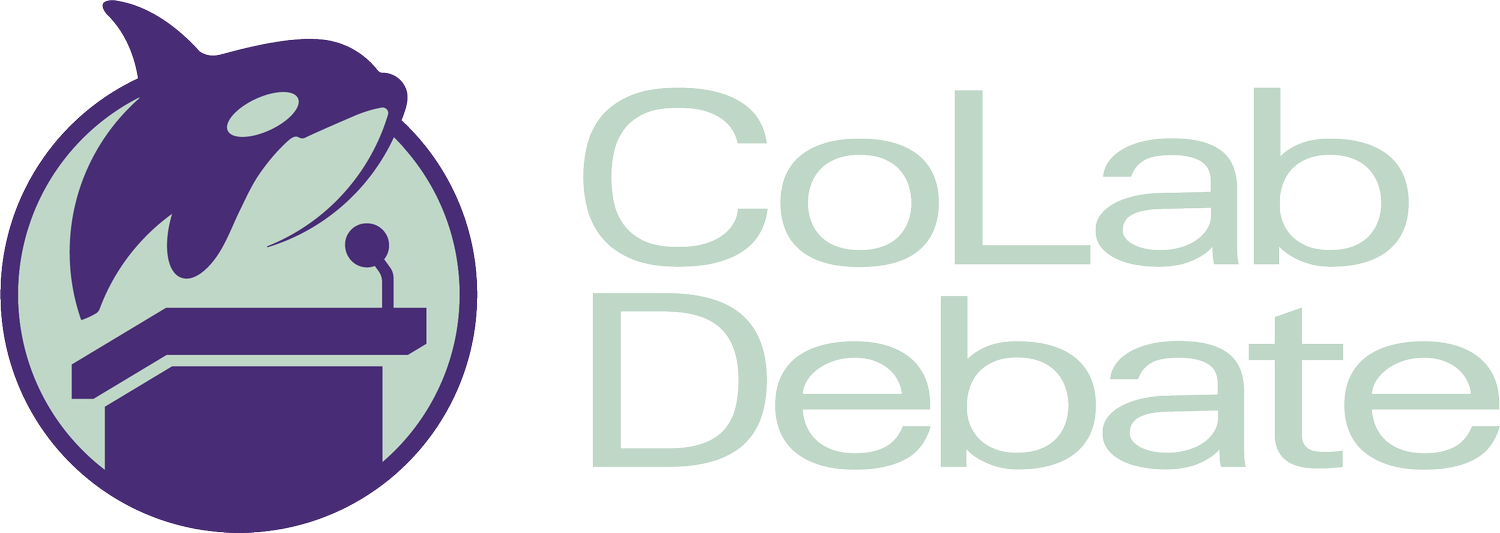CoLab Debate: Because We Need Collaborative Debate Education Now
What is CoLab?
CoLab Debate is an educational site for a kind of debating that is collaborative, format-and-media-diverse, and geared toward concrete community engagement.
Motivated in November 2024 by profound developments in the United States, we undertook to create an Oregon-based national nonprofit learning center for debate and collaborative leadership. Nine months later, we're creating our curriculum and learning sites, building a national network of advisors and helpers, and listening to a multitude of perspectives on what is needed to build a consistent, inclusive, and durable path from debate education to community leadership.
When we begin our year-round programs this year and host our pilot summer programs in 2026, our curriculum will bring together forensics, grassroots democracy, cooperative skills and critical thinking for debate students and coaches interested in debate's path to community organizing and public interest work. We'll strongly emphasize material access to this space for systems-impacted students (our summer program will provide all-expense scholarships to a growing cohort of students).
Why CoLab now?
CoLab is not here to crowd out traditional debate education, or the many outstanding leagues, organizations, and educators who facilitate it. Our goal is to plant a new garden alongside the existing one. Debate has always been deeply anchored in democratic institutions and robust educational networks, but we have no idea what those structures will look like in the coming years. That uncertainty motivated us to ask which debate skills need new attention, and what kind of space we could create that debate students and teachers would find helpful.
The answer to that question reveals an urgency shared by the many people with whom we discussed the project in the months following the November elections.Today's young people, and indeed all of us, will need collective problem solving skills cultivated by networks of community-focused leaders and organizations, with the ability to skillfully deliver and critically receive communication. We will need organizing skills for whatever kind of organizing will need to happen.
Many debate scholars and coaches (including some folks on CoLab's Advisory Board) have provided important insights like the need to connect debates to wider spheres of real-world deliberation, the struggle against the privileging of colonial and hegemonic elitism, and even the possibility of reimagining debate as a cooperative endeavor to strengthen communal bonds. They have designed events and rubrics to make debate more invitational and community-friendly without sacrificing rigor and competitiveness. We think it's urgent that such work be intentionally cultivated in dedicated spaces.
We were also sparked by the many debate students we've spoken with who have told us, unprompted, that their motivation for debating is tied to their desire to improve their own communities, neighborhoods, and schools. These students see argument as a means of repair, advocacy, and collective care. Some (not all) are less interested in the hyperadversarial world of top-level competitive debating, and want to roll up their sleeves and begin making a difference now.
We’re launching the CoLab curriculum now because we believe the collaborative skills students build through debate—especially in open, creative environments—are essential for navigating an unpredictable future. Whatever federal politics, international relations, or our school systems look like in the next 2, 5, or 15 years, students will need tools for working together to solve shared problems. Our programs will provide the tools to meet these needs.
Finally, we emphasize cooperation and collaboration not only because they're necessary for democratic communities to survive, but because they are joyful and hopeful. We emphasize debate not only because it is unmatched in its educational efficacy, but because, from its sometimes absurd game-like qualities to its optimism that people and policies can be persuaded to transform, it is also joyful and hopeful.
How will CoLab do it?
CoLab offers the following:
New speech and debate models with rubrics, structures, resolutions, and channels of advocacy fitting this time and place.
Summer camps and year-round courses on community organizing, stakeholder advocacy, and coalition-building, with scholarships, special events, and multi-layered instruction.
A forum for thinking and talking about debate, community, and best practices during democratic precarity.
Engagement with multiple networks: campuses, service organizations, both faith-based and secular community organizers, incarcerated and prison-impacted communities, and a wide array of public interest advocates.
A network connecting interested learners and aspiring organizers with change-makers and leaders in public advocacy.
Curricular materials to help localize and personalize debate topics for student empowerment.
A well-lit pathway from speech and debate to community-driven public interest work.
In these ways, CoLab will fulfill what community-minded students and instructors want and need from debate education: channels into organizations driving social impact advocacy in local, state and national communities now; skills like cooperative culture, conflict de-escalation and resolution, and campaign-building; ethical examination and meaningful use of communication technologies; and tools to examine traditional ways of organizing and experiment with new ones.
Ours will be a space where participants interested in collaborative skills can utilize debate's tremendous generative energy and intellectual rigor, where debate judges will reward cooperation and mutuality among co-competitors engaged in common cause, and where students will learn to construct arguments for and on behalf of real communities that advance ethical solutions to the numerous challenges ahead.
